|

Summer 2004 (12.2)
Pages
44-45
The Ali and Nino Walking Tour
by Betty Blair and Fuad
Akhundov
Academy of Sciences
Istiglaliyyat 10
(Pre-Soviet: Nikolayevskaya Street)
Back
to Ali & Nino Walking Tour Index
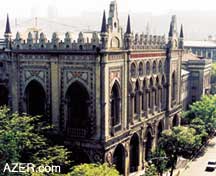  This
building was constructed as a memorial to the son of the wealthiest
of oil barons, Musa
Naghiyev (1849-1919). Unfortunately, his wealth was not able
to save his son Ismayil from a tragic death from tuberculosis,
a scourge that was so prevalent in that day. The building's intended
use was for the Moslem Philanthropic Society. The building was
designed by Polish architect I.K. Ploshko and under construction
from 1907-1913. This
building was constructed as a memorial to the son of the wealthiest
of oil barons, Musa
Naghiyev (1849-1919). Unfortunately, his wealth was not able
to save his son Ismayil from a tragic death from tuberculosis,
a scourge that was so prevalent in that day. The building's intended
use was for the Moslem Philanthropic Society. The building was
designed by Polish architect I.K. Ploshko and under construction
from 1907-1913.
In March 1918 when the Armenians and Bolsheviks raged through
the city, slaughtering an estimated 10,000 Azerbaijanis, the
building which came to be known as "Ismayiliyya" was
torched. Naghiyev's descendents insist that the combined loss
of his son and the burning of the building, which had been dedicated
to his son's memory, left him a broken man. He died the following
year of a broken heart.
The Soviets rebuilt the hall and today it houses the Presidium
of the Academy of Sciences, but still so often it is referred
to as "Ismayiliyya".
Musa Naghiyev features predominately in a scene in "Ali
& Nino" when the most influential oil barons gather
to meet with Ali's Father in their home on Kichik Gala Street
in the Old City.
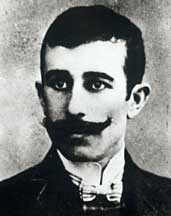  Left: Ismayil Naghiyev. Left: Ismayil Naghiyev.
Other historic figures who attended this meeting in the novel
include: Taghiyev (1823-1924), Ashurbeyli and Asadullayev. The
narrator of the novel dubs this group as "The Assembly of
'One Thousand Million Rubles' [1,000,000,000 or 1 billion rubles]".
Naghiyev's Building is directly on the opposite side of the wall
of the citadel from Ali's home. In the novel, Naghiyev's statements
are viewed as the most profound expressed that night.
Extremely worried about the deteriorating political scene, the
millionaires wonder what the future holds and what will become
of them. Little did they know that the Bolshevik occupation of
their land in 1920 would bring an absolute end to their entrepreneurial
capitalist activity for more than 70 years. In most cases, those
who did not flee to neighboring countries were assassinated or
imprisoned. Only in late 1991 when the Soviet Union collapsed,
did Azerbaijan regain its independence and once again the entrepreneurial
began to revive.
[To understand the sentiments of Oil Barons after the Bolsheviks
took over Baku, see the short story "Maybe They'll Give
It All Back", by Jalil Mammadguluzade in AI 7.1 (Spring
1999). Search at AZER.com.]
From "Ali & Nino",
pages 136 ff.
"One day my father said: "Stay in tonight, Ali Khan.
Some people are coming, and we will discuss important things."
He sounded a bit embarrassed, and glanced away. I understood
and teased him: "Didn't you make me swear, Father, never
to have anything to do with politics?"
Below: The Ismailiyya Building.
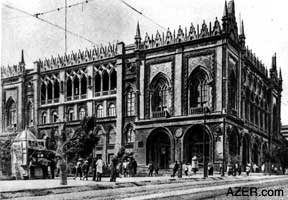  "Caring
for one's people does not necessarily mean politics. There are
times, Ali Khan, when it is one's duty to think of one's people". "Caring
for one's people does not necessarily mean politics. There are
times, Ali Khan, when it is one's duty to think of one's people".
"I had arranged to take Nino to the opera that night. Shaliapin
was appearing that night as a guest artist and Nino had been
looking forward to attending it for days.
"Our guests arrived at 7 o'clock, and they were exactly
the people that I had expected to see. In our great hall, sitting
on the red carpets and soft divans, were assembled "one
thousand million rubles", or rather the men who, between
them, commanded over one billion rubles.
"There were not many of them, and I had known them all for
years. Seinal Aga [Haji Zeynalabdin Taghiyev, referred to as
Zeynal Agha here], Ilyas Bey's father, was the first to arrive.
His back was bent; his eyes had a veiled look. He lowered himself
onto a divan, put his cane down, and thoughtfully started to
eat a piece of Turkish delight [type of candy].
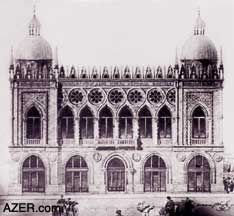  Left: One of the renderings for the architectural design
of the building which, fortunately was rejected. Left: One of the renderings for the architectural design
of the building which, fortunately was rejected.
"Then came two brothers: Ali Assadullah and Mirza Assadullah
[Asadullayev]. Their father, the late Shamsi, had left them a
dozen million rubles. The sons had inherited their father's intelligence,
but they had also learned to read and write.
"Mirza Asadulla loved money, wisdom and peace. His brother
Ali was like Zarathustra's fire-burning, but not burning to death.
[Zarathustra, 628-551 BC, was the founder of Zoroastrianism].
He was always moving around, and loved war, adventure and danger.
Many stories were told about him throughout the country-stories
of fights, assaults and bloodshed.
"Sullen Burjat Sade, sitting next to him, did not love adventure,
but love. He was the only one of us who had four wives, always
bitterly at war with each other. He was very ashamed of this
situation, but could not change his nature. When asked how many
children he had, he would answer sadly: "Fifteen or eighteen,
how would I know, poor man that I am?" And if asked about
his millions he would give the same answer.
"Yusif Oghlu, sitting at the other end of the hall, looked
at him with disapproval, and jealousy. He had only one wife,
and it was said she was not good looking. On their wedding day,
she had told him: "If you squander your sperm on other women,
I'll cut their ears off, and their noses and their breasts. And
what I'll do to you, I don't even want to say."
"As this woman's kinsfolk had a well-deserved reputation
of being quick on the draw, her threat had to be taken seriously.
So the poor man collected pictures.
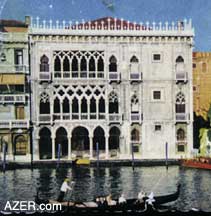  Left: Residence in Vienna which provided the inspiration
for Ismayiliyya building. Left: Residence in Vienna which provided the inspiration
for Ismayiliyya building.
"The man who came into the hall at half past seven was very
small and very thin. The nails of his delicate hands were tinted
red. We all rose and bowed to him, honoring his misfortune. Ismayil,
his only son, had died a few years earlier. The father had built
a splendid house in Nikolai Street [now Istiglaliyyat Street].
The name "Ismayil" shone on the front in big golden
letters, and the house was dedicated to Islamic charity. His
name was Aga Musa Nagi [Agha Musa Naghiyev], and he was a member
of our circle only by virtue of his two hundred million rubles
for he was not a Muslim any more. He belonged to the heretic
sect of the Bahaists, founded by [1820-1850], whom Shah Nasraddin
had had put to death. Only very few of us knew what Bab's teachings
were. But we all knew that Nasraddin had had red-hot needles
put under the nails of Bahaists, burnt them alive and flogged
them to death. Very evil indeed must be the teaching of a sect
that deserves such punishment.
At 8 o'clock all guests had assembled. There they sat, the Oil
Princes, drinking tea, eating sweets, and telling each other
of their booming businesses, of their houses, their horses, their
gardens and their losses at the green table in the casino. So
they talked till 9 o'clock, as etiquette decreed.
Above: Clockwise from top left: The most well-known
Oil Barons in Baku: Taghiyev, Naghiyev, Ashurbeyli and Asadullayev.
"Then the servant
cleared away the tea, closed the doors, and my father said; "Mirza
Asadulla, son of Shamsi Asadulla, has given much thought to the
fate of our people. Let us hear him." Mirza Asadulla raised
his beautiful dreamy face: "If the Grand Duke wins, there
will not be one single Muslim country left on the map. Heavy
will be the Czar's hand. He will not touch us who are here tonight
because we have money. But he will close our mosques and schools,
and forbid us to speak our language. Strangers will overrun the
land, for there will be no one to defend the people of the Prophet.
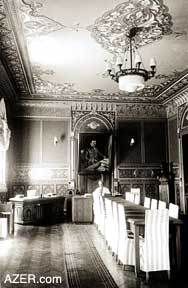  Left: Inside the Ismayiliyya Building which was built
by Musa Naghiyev, Baku's wealthiest Oil Baron. Obviously, this
photo was taken during the Soviet period, probably late 1920s
or early 1930s. Note portrait of Stalin. All property was confiscated
by the Soviet government when the Bolsheviks took control of
Baku in 1918. Left: Inside the Ismayiliyya Building which was built
by Musa Naghiyev, Baku's wealthiest Oil Baron. Obviously, this
photo was taken during the Soviet period, probably late 1920s
or early 1930s. Note portrait of Stalin. All property was confiscated
by the Soviet government when the Bolsheviks took control of
Baku in 1918.
"If Enver [Enver Pasha, 1881-1922 Ottoman General and Commander
in Chief who occupied Baku in 1918 for a short period before
the Bolsheviks took power] wins, it would be better for us, even
if his victories were few.
"But can we do anything about it either way? I say we cannot.
We have money, but the Czar has more. What shall we do? Perhaps
we should give the Czar some of our money and some of our men.
His hand might not be so heavy on us after the war, if we give
him a battalion. Or is there another way?"
"His brother Ali raised himself. He said: "Who knows,
maybe after the war there won't be a Czar any more."
"Even so, my brother, there still would be too many Russians
in our country."
"Their number can be reduced, my brother."
"We can't kill them all, Ali."
"We can kill them all, Mirza."
They were silent. Then Zeynalagha spoke, very softly, tired with
age, and quite without expression: "No one knows what is
written in the Book. The grand Duke's victories are no victories,
even if he were to take Stamboul [Istanbul]. The key to our destiny
does not lie in Istanbul, but in the West. And there the Turks
are victorious, even if they are called Germans. Russians are
occupying Trapezund, Turks are occupying Warsaw. Russians? Are
there any left? I have heard that a peasant-I believe his name
is Rasputin-rules over the Czar, caresses the Czar's daughters
and calls the Czarina Mama. And there are Dukes who want to dethrone
the Czar, and people who just wait for peace, so they can start
a revolution. After the war, everything will be quite different."
"Yes," said a fat man with brilliant eyes and a long
moustache, "everything will, indeed, be different after
the war." This was Fatali Khan of Khoja [Fathali Khan Khoyski],
a lawyer by profession. We knew that he was always thinking about
The People and Their Cause.
"Yes," he added fervently, "and as everything
will be so different, we need not beg for anyone's favors. Whoever
wins this war will come out of it weak and covered with wounds,
and we, who will be neither weakened nor wounded, will then be
in a position to demand, not to beg. We are an Islamic, a Shiite
country, and we expect the same from the House of Romanov as
from the House of Osman. Independence in everything that concerns
us! And the weaker the Great Powers are after the war, the nearer
is freedom for us. This freedom will come from us, from our unspent
strength, from our money and our oil. For do not forget: the
world needs us more than we need the world."
"The 'Thousand Million Rubles' assembled in the hall were
very satisfied. "Wait and see" was a good policy. We
have got the oil; the victors will have to beg for our favors.
And what will we do till then? Build hospitals, children's homes,
blind people's homes-for those who fight for our faith. No one
could accuse us of lack of character. I sat in a corner, silent
and angry.
"Ali Asadulla came across the hall and sat down next to
me. "And what do you think, Ali Khan?" Without waiting
for an answer, he bent forward and whispered: "Wouldn't
it be wonderful to kill all Russians in our country? And not
only the Russians-kill all these foreigners who talk and pray
and think differently from us. We all want to do that, really,
but I'm the only one who dares to say it aloud. And what then?
As far as I'm concerned, Fathali can rule, though I prefer Enver.
But first we must exterminate all foreigners." He spoke
the word "exterminate" with such tender longing, as
if it meant "love." His eyes shone, he smiled mischievously.
I did not answer.
"Now Musa Naghi, the Bahaist, spoke: "I am an old man,"
he said, "and I am sad to see what I see, and to hear what
I hear. The Russians are killing the Turks, the Turks are killing
the Armenians, the Armenians would like to kill us, and we the
Russians. Is this good? I do not know.
"We have heard what Zeynal Agha, Mirza, Ali and Fathali
think of our people's fate. I understand they care deeply about
schools, our language, hospitals and freedom. But what use is
a school when what is taught there is nonsense, and what use
is a hospital if it is the body only that is healed there, and
the soul is forgotten? Our soul strives to go to God. But each
nation believes they have God all to themselves, and He is the
One and only God. But I believe it is the same God who made Himself
known through the voices of all sages. Therefore, I worship Christ
and Confucius, Buddha and Mohammad. We all come from one God,
and through Bab, we shall all return to Him.
"Men should be told that there is no Black and no White,
for Black is White and White is Black. So my advice is this:
let us not do anything that might hurt anybody anywhere in the
world, for we are part of each soul, and each soul is part of
us." We sat silent, nonplussed. So this was the heresy of
Bab. Suddenly I heard loud sobbing, turned round and saw Asadulla,
his face bathed in tears, and distorted with grief.
"Oh my soul!" he sobbed, "How right you are! What
happiness to hear your words! O Almighty God! If only all men
could find wisdom as profound as yours!" Then he dried his
tears, sighed deeply and added, noticeably cooler: "Doubtlessly,
venerated sir, the hand of God is above all our hands but, nevertheless,
Oh, fountain of wisdom, the truth is, that one cannot always
depend on the Almighty's merciful intervention. We are but men,
and if inspiration fails, we have to find ways to overcome our
difficulties." It was a clever sentence, as clever as his
tears had been. Mirza was looking at his brother, full of admiration.
The guests rose. Slender hands touched dark rows, saluting.
Backs bent low, lips murmured; "Peace be with you. May the
smile remain on your lips, friend."
"The meeting was over. The "Thousand Million Rubles"
went out into the street and parted, nodding, saluting, shaking
hands. It was half past ten. The hall was empty and depressing.
I felt very lonely."
Back to Ali and Nino Walking
Tour Index
Back to Index AI 12.2 (Summer
2004)
AI Home
| Search | Magazine
Choice
| Topics
| AI Store | Contact us
Other Web sites
created by Azerbaijan International
AZgallery.org | AZERI.org | HAJIBEYOV.com
|